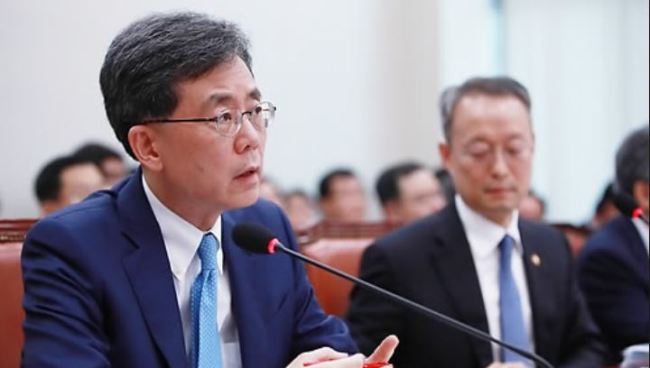South Korea's trade ministry said Monday it will hold talks with China to expand the scope of the two countries' free trade agreement to the service and investment sector in a way to create new business opportunities for local companies in the tourism, culture, legal\ and medical industries.
The Ministry of Trade, Industry and Energy held a meeting with industry officials and trade experts to collect their opinions before launching the follow-up FTA negotiations with Beijing.
South Korea and China implemented the FTA focused on lowering tariffs on goods in December 2015 and are set to engage in talks to include the service and investment sectors.
 |
South Korea`s trade minister Kim Hyun-chong (Yonhap) |
"The follow-up FTA negotiations with China will provide an important opportunity to get ahead in China's fast growing service market and improve the South Korean service industry's competitiveness," Trade Minister Kim Hyun-chong said in a release ahead of the meeting. "The government will step up efforts to open markets in major areas, including tourism, culture, legal and medical services, and create a stable business environment."
China has been reducing its focus on manufacturing to restructure itself toward a more service-oriented economy. China's service industry weighed in at $5.6 trillion in 2016, becoming the world's second-biggest market.
Since South Korean companies have grappled with non-trade barriers like investment restrictions and regulations, industry experts expressed hope that follow-up negotiations would pave the way for easier access to a market of 1.4 billion Chinese consumers.
"The government should draw up its negotiation strategy for the service and investment area based on accurate understanding of the Chinese system and regulations through close communications with businesses," said Kim Young-joo, president of the Korea International Trade Association.
Local companies stressed the importance of the Chinese government's transparency and consistency in implementing regulations on foreign companies and investors to create a stable business environment regardless of the diplomatic relations between the two nations.
Last year, South Korean retailers and tourism agencies suffered from weak sales and unfavorable sentiment in China over Seoul's deployment of an American missile system, which has soured two-way relations and triggered a boycott of South Korean-made goods.
Provincial Chinese governments also banned the sale of group tours to Seoul, seen as retaliation against the installation of a Terminal High Altitude Area Defense battery. The move has dealt a harsh blow to local duty-free shops as Chinese tourists were their main customers.
The trade ministry said it will reflect on the opinions of industry officials from various sectors when submitting its FTA negotiation plan to the National Assembly, before launching official talks with China, although it did not elaborate on specific schedules.
On Friday, Finance Minister Kim Dong-yeon will meet with He Lifeng, chairman of China's National Development and Reform Commission, to discuss ways to step up economic cooperation and boost trade between the two nations. (Yonhap)








![[Weekender] Korea's traditional sauce culture gains global recognition](http://res.heraldm.com/phpwas/restmb_idxmake.php?idx=644&simg=/content/image/2024/11/21/20241121050153_0.jpg)